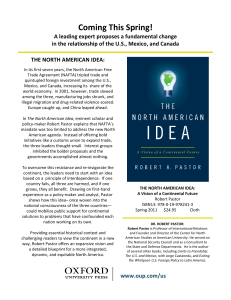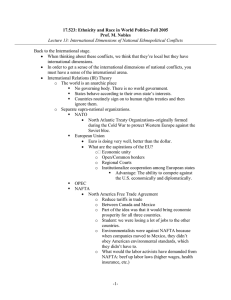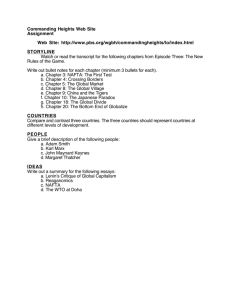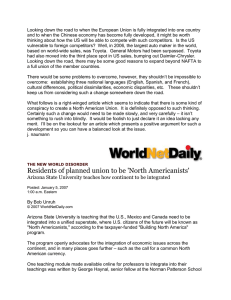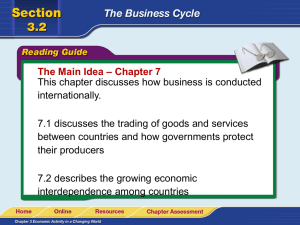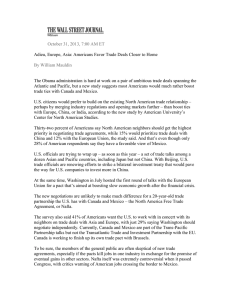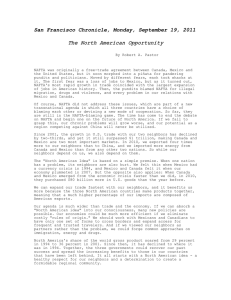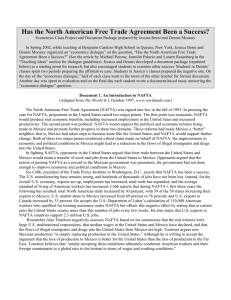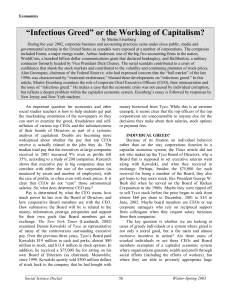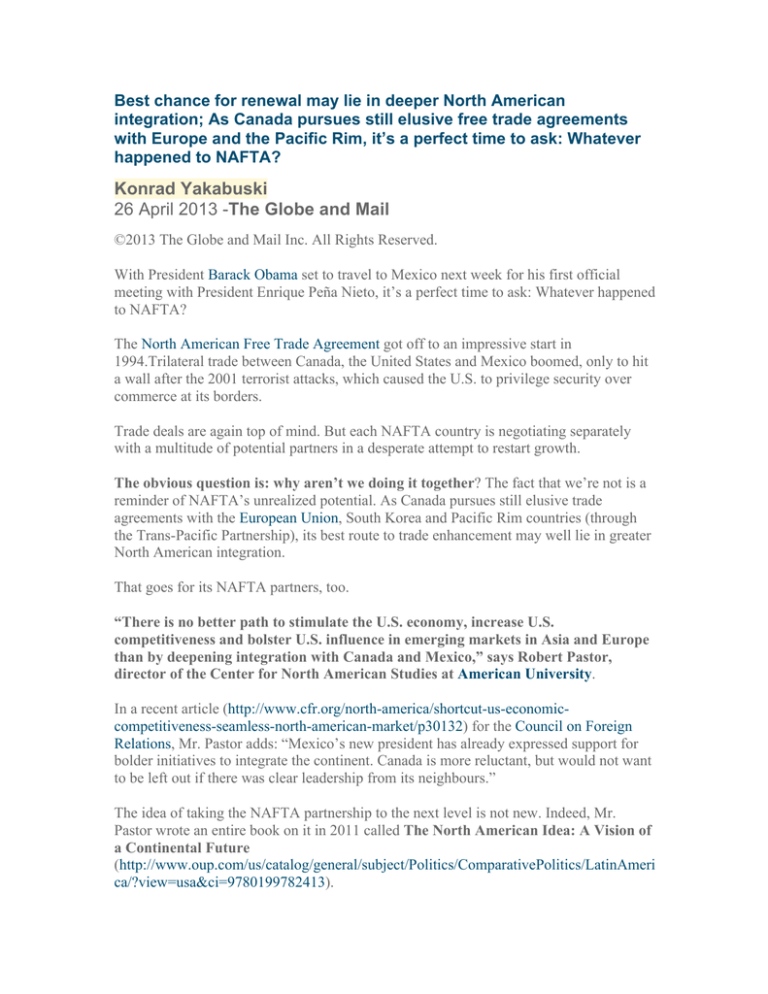
Best chance for renewal may lie in deeper North American
integration; As Canada pursues still elusive free trade agreements
with Europe and the Pacific Rim, it’s a perfect time to ask: Whatever
happened to NAFTA?
Konrad Yakabuski
26 April 2013 -The Globe and Mail
©2013 The Globe and Mail Inc. All Rights Reserved.
With President Barack Obama set to travel to Mexico next week for his first official
meeting with President Enrique Peña Nieto, it’s a perfect time to ask: Whatever happened
to NAFTA?
The North American Free Trade Agreement got off to an impressive start in
1994.Trilateral trade between Canada, the United States and Mexico boomed, only to hit
a wall after the 2001 terrorist attacks, which caused the U.S. to privilege security over
commerce at its borders.
Trade deals are again top of mind. But each NAFTA country is negotiating separately
with a multitude of potential partners in a desperate attempt to restart growth.
The obvious question is: why aren’t we doing it together? The fact that we’re not is a
reminder of NAFTA’s unrealized potential. As Canada pursues still elusive trade
agreements with the European Union, South Korea and Pacific Rim countries (through
the Trans-Pacific Partnership), its best route to trade enhancement may well lie in greater
North American integration.
That goes for its NAFTA partners, too.
“There is no better path to stimulate the U.S. economy, increase U.S.
competitiveness and bolster U.S. influence in emerging markets in Asia and Europe
than by deepening integration with Canada and Mexico,” says Robert Pastor,
director of the Center for North American Studies at American University.
In a recent article (http://www.cfr.org/north-america/shortcut-us-economiccompetitiveness-seamless-north-american-market/p30132) for the Council on Foreign
Relations, Mr. Pastor adds: “Mexico’s new president has already expressed support for
bolder initiatives to integrate the continent. Canada is more reluctant, but would not want
to be left out if there was clear leadership from its neighbours.”
The idea of taking the NAFTA partnership to the next level is not new. Indeed, Mr.
Pastor wrote an entire book on it in 2011 called The North American Idea: A Vision of
a Continental Future
(http://www.oup.com/us/catalog/general/subject/Politics/ComparativePolitics/LatinAmeri
ca/?view=usa&ci=9780199782413).
2
But the issue taken on new saliency with Mr. Peña Nieto’s election last year and the
ambitious reform agenda he has outlined for his six-year mandate.
Mexico is seeking to introduce competition into the country’s telecommunications sector
and potentially allow Pemex, the state-owned oil company, to enter partnerships with
foreign players to develop the country’s untapped resources. A booming Mexican
manufacturing sector – which is benefiting from rising costs in Asia – beckons Canadian
firms seeking to build continental supply chains. And a fast-growing Mexican middle
class is creating a lucrative market for imported wares.
Council on Foreign Relations senior fellow Edward Alden finds it “odd”
(http://blogs.cfr.org/renewing-america/2013/03/12/north-america-big-trade-gains-closeto-home) that all three NAFTA partners have focused on new trade deals outside North
America, when “the sheer volume of trade in North America far outweighs the trade
involved in any of these [other] initiatives. Small gains in increasing continental trade
flows would pay big benefits in terms of economic growth.”
Mr. Pastor’s proposal for a “seamless” North American market would involve a common
external tariff, the elimination of all restrictions in transportation and a continental
approach to planning and building infrastructure. A trilateral approach to immigration
would remain off the table, but he thinks “the United States and Canada should permit
their citizens to work freely in either country.”
Given the lack of meaningful progress on the Canada-U.S. Beyond the Border initiative
(http://actionplan.gc.ca/en/content/beyond-border), it is hard to imagine that Ottawa or
Washington would be very eager to tackle the even stickier task of harmonizing their
regulations with Mexico’s.
But as Mr. Pastor points out, it all comes down to leadership.
[NA/CONF/PRESS/ Yakabuski -26 April 2013 -The Globe and Mail -CFR -NA OVER ASIA]

